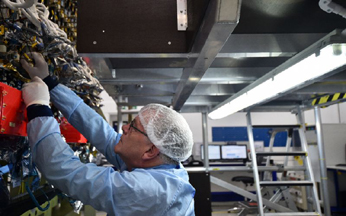PORTSMOUTH, United Kingdom, Feb 27, 2018 (BSS/AFP) – British astronaut Tim Peake on Monday hailed a “groundbreaking” satellite being built by Airbus which its developers say will bring an unprecedented level of flexibility to space telecommunications.
The Eutelsat Quantum satellite is being put together by the multinational company in Portsmouth, on the south coast of England, where it was unveiled Monday ahead of transfer to France for testing later this year.
When launched in 2019 it will for the first time allow a commercial satellite to be fully reconfigurable while in orbit, with operators able to change key elements in real time, such as its frequency and which parts of the earth it covers.
“What is really new is the level of flexibility that the satellite will provide and so this will be thanks to a combination of technologies that we will put on board the satellite,” said Yohann Leroy, deputy CEO of French satellite operator Eutelsat.
Leroy said the new technology also allows operators to adapt to different regulatory constraints around the world and adjust to changing market conditions in the 15-year life span of the satellite.
“There can be much faster change in market demand, seasonal demand or even daily demand,” he told AFP.
Allowing passengers to connect to the internet while flying over the Pacific Ocean is just one example of innovative satellite use, with demand changing according to flight schedules, Leroy added.
Visiting the Airbus site astronaut Peake — who in 2015 became the first British European Space Agency (ESA) astronaut to visit the International Space Station — said the enterprise was an example of British innovation in space.
“It’s a European Space Agency-led programme but being built here in the UK,” said Peake, noting the antenna array is coming from Spain.
“So there’s international partnership from small satellites to major space stations, and I think the UK will continue to do well to look globally for those partnerships.”
Cooperation on such pioneering projects will continue beyond Britain’s upcoming departure from the European Union, predicted Peake, adding that membership of the ESA is not dependent on being part of the block.
Graham Turnock, chief executive of the UK Space Agency, said Britain needed to “be at the forefront of innovation” in order to retain a leading position in the space industry.
“So this new satellite… I think is really exciting and it gives us the ability to be at that particular part of the leading edge,” he told AFP.



